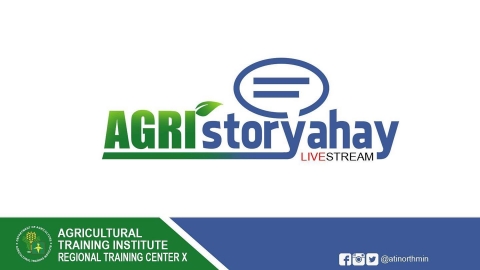One of the ATI’s guiding mantra is extension delivery beyond boundaries. Before the pandemic happened, this is easier said than done. There is always a question of turfing or even the limitations and legal ramifications imposed when you literally go beyond your Physical Boundaries. Of course, boundaries could be interpreted not only in the Physical sense as everything is open to interpretation, and for the Commission on Audit, justification.
With the new normal and the difficulties of physical travel, our office, like many other offices doing extension, have no recourse but to adapt to the new normal. Our face-to-face trainings were converted to webinars while meetings, field validations and coordination with partners became virtual. This is actually difficult because it needs new skill sets, new mindsets and even new equipment. Still we were able to adjust and adopt. Our choice is either to sink or swim. We decided not just to swim but to win.
I am a person who refuse to look at the negative side of things. It is stressful and counter productive. Being assigned in Operations in the office, I need to recalibrate, refocus and shift my paradigm if I am to lead successfully. Targets and budgets are non-negotiables. They have to be met. The only thing that we could do is to shift methodologies.
The first thing that we did is to reprogram our face-to-face trainings to webinars which we named “Agristoryahay sa ATI.” The shift is hard because travel restrictions prevented us from face-to-face planning for the revision of our Work and Financial Plan. Thus we went to the next viable thing which is virtual meetings. And for this, we are really glad for the strides reached in the telecommunications industry. We would like to make special mention of Messenger, Google Meet, Zoom and other platforms that made all our meetings possible. In planning, we assess the strengths of each staff in terms of ICT capability.
Those who are on “Work From Home” (WFH) status were forced to shoot for our webinar episodes especially if they are near an ATI Certified Learning Site for Agriculture (LSA). We assess the Learning Site’s strengths and technologies and of course the capability of the owner to train and demonstrate while the camera is focused on him. Our staff who is on WFH has to coordinate with our LSA, write the script and shoot the video using only cellphones since our cameras were left in the office. These are new skill sets for our staff. Tutorials were made online. In fact, once the storyline was made by the particular staff who was assigned for a webinar episode, he or she submits it to our designated Editors who are also in a WFH status. After editing, the storyline or even the script is sent back to the staff who will then be the cameraman/ editor/ director/scriptwriter rolled into one. After the shoot, another staff who is assigned in video editing will receive the file containing the raw shots. It may seem easy when described but problems on slow internet and limited equipment made the simplest thing difficult. Imagine our assigned staff in the field has only a cellphone available. And he needs not just one but at the very least two because one will function as a microphone. In the early episodes, the daughter or the wife of the farm owner often acts as the second camera man.
During those times, when we need to stay healthy, we had many sleepless nights especially when technical glitches happen and we have already scheduled the webinar. While our staff is shooting the episode, another group has to shoot for the intro and extro which involves a set of program hosts, script writer, editor, director, producer and the like. Another group takes charge of promotion, online registration, online evaluation, sending of certificates and making of reports. To think that there are only few people (as we are only few in the office), involved and multiple roles and multi-tasking became the new normal. Despite the hardships, we have consistently conducted webinars weekly since April. Still, we were able to do it, and biases aside, I claim that we did it with flying colors. I am claiming this based on web analytics and over-all performance within the network.
Since we used Facebook as our platform, our reach has skyrocketed and we have viewers from as far north as Ilocos and down south to Zamboanga. We also have viewers abroad and take note, not limited to Filipinos only. The feedbacks were heartwarming and they even went to as far as sending us their stories and pictures where they applied what they learned. We have loyal viewers who message us regularly. We have not only triumphed geographically. We have transcended age, profession and gender. We have young students, farmers, agri enthusiasts but we have also teachers, retirees, senior citizens, professionals, full-time farmers and many more. We have members of Indigenous tribes who are active and even PWDs.
The episodes from April to August delved with urban agriculture and other production technologies. The episodes from September to December are all devoted to agri-processing using farm produce such as fruits, vegetables, meat and fish.
Indeed, the results far exceeded our expectations. We transcended boundaries in all aspects, not only the physical. While before the pandemic, our regular number of participants per training is only thirty (30), with the webinar we have reached hundreds and even thousands. And doing webinars is less expensive so we were able to give prizes and after training support to some of our viewers. The methodology we used may be new, but our commitment to do better has been reinvigorated as we reach new heights, gained new friends and loyal viewers.
This pandemic may have wrecked havoc to most, around the world, but for us, it gave us an opportunity to reach more and bring extension delivery to new heights- without boundaries.

